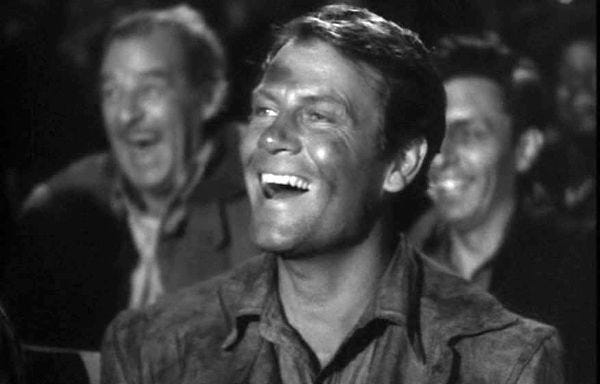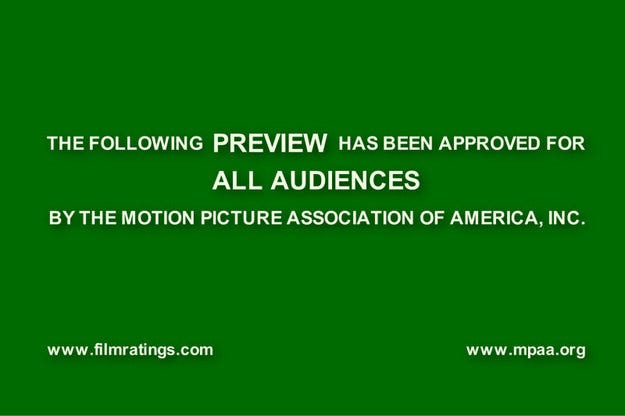Two weeks ago, I posted “The Biggest Lie about the Movies,” an essay about the myth of moviegoers united in the dark as they experience the communal spirit of cinema. Short version: seeing films in a theatre has been ruined by audiences who can’t behave and exhibitors who won’t correct them. These exhibitors also make things worse with endless trailers and trash before the movie and a disregard for the experience they are supposed to provide. Albert Cory, who ran the Google Cinema Club for ten years and writes the Substack Life Since the Baby Boom, posted these comments:
Here’s my Charles Foster Kane-like Declaration of Principles on how I would run a movie theater. There’s nothing extraordinarily imaginative here, other than letting the film be the focal point of the experience.
1. No reserved seats, although you can buy tickets online. This may sound contradictory: if I’m already buying the tickets online, why not let me choose the seats? The idea is to make things move more quickly at the physical box office. You can either show your online barcode or, if you’re at the box office, simply buy your tickets. Reserving seats ahead of time encourages people to come late, knowing that their reserved seats will be waiting for them; not allowing reserved seats encourages people to arrive on time so that they aren’t in the first row. My local theater uses this model and it works very well. When the lights go down, there may be a few stragglers, but usually everyone is seated and ready to go when the movie begins. If you want to see the movie, get there on time, because the movie is why you are there. Of course, people who now reserve seats come late to avoid the endless pre-movie nonsense, but …
2. Two Trailers. Trailers have become as repetitive and dull as the movies they advertise. There are many videos on YouTube that break down the formulas for each genre and remind us of the mind-numbing experience of watching the same 150-second mini-movies over and over. The Pages and Frames Theatre would show only two. That’s it–and no Nicole Kidman, Maria Menounos, ads for Coke, Indeed, or anything else. (I know that distributors attach these trailers to the features and the theatres are often left without a choice, but this is a dream scenario. Besides, I’ve seen many first-run, big budget films at independent theaters that didn’t show hours of ads.)
3. Simple Snacks. We’d sell only popcorn, soda, and M&Ms. That’s it. We spend enough of our days in lines behind people who take forever—we have all been behind that guy in Dunkin’ who is selecting his dozen donuts for the office break room like he’s a sommelier at the court of Louis XVI or the woman at the bagel place who carefully ponders each addition to the dozen like it’s for someone’s last brunch. Fewer options make faster lines—remember, the movie is why we are there. We haven’t come to have a barista whip up a crazy coffee concoction or examine Willy Wonka’s candy counter. (Even the M&Ms will be only plain or peanut.) Under no circumstances will we sell anything resembling “real food.” Dine-in theaters are anathema. If the food at a dine-in theater is good, why not enjoy it as its own focus? And if it’s not, why eat it? I also don’t need to hear the guy next to me making what Mattie Ross in True Grit calls “mouth noises” or smell his dinner. A theater isn’t Yankee Stadium: it’s an indoor experience often meant to be very quiet.
I’ll never forget the time I saw The Passion of the Christ in the theatre and, as I sat there waiting for the lights to go down, some people walked up the aisle with trays of nachos and hot dogs.
4. No talking or phones. The theatrical equivalent of hall monitors would be placed in the last row. Any time someone starts yapping or texting, viewers can raise a hand and the malefactors will get a gentle reminder that the movie is why we’re all there. Repeated infractions would result in dismissal. This is akin to what Alamo Drafthouse has done and although they filed for bankruptcy and were swooped up by Sony Pictures, they are still enforcing their house rules. In his very sharp essay on the decline of theatre attendance, Scott Phillips of Forbes says, “People want movies. They just want to experience them away from screaming children and chit-chatty adults.” Even a mediocre movie is better without being distracted by one’s neighbors’ lack of manners.
5. No late entry. No one is seated after the movie has been running for two minutes. The people there all managed to get there and don’t need to deal with latecomers wandering the aisles or climbing over them. Things happen, we get stuck in traffic—I get it—and as a gesture of empathy, if you bought tickets but arrived late, you can use the tickets for another show. Again, this encourages people to arrive early because the movie is the reason why we’re all there. The great director George Clouzot demanded this rule for his Diabolique in 1955 and Hitchcock demanded it for Psycho in 1960. They made these demands as part of movie puffery, of course, but they also respected the experience and wanted their viewers to experience the suspense as it built from the opening scenes.

But there’s no need to restrict this kind of starting-time curfew for suspense movies: who could appreciate Bringing Up Baby, Citizen Kane, or even Animal House without seeing the first ten minutes? And if “it doesn’t matter,” stay home, because you’re more likely to be the person blabbing the whole time.
The theatres cry about the effects of COVID, but that’s what Kurt Vonnegut called a foma, a lie we tell ourselves to help us feel better. Taylor Swift seems to have bounced back. And I’m not a grouch or an old man yelling at a cloud: one of my favorite movie moments is when, near the end of Sullivan’s Travels (1941), we see millionaire director and would-be social justice warrior John L. Sullivan (Joel McCrea) watching a Mickey Mouse cartoon with his fellow chain-gang prisoners: at first astonished by their reaction, because he assumed they would want to see “important” films that showed their plight, he is swept up by their laughter and joins their common humanity. Preston Sturges, the actual director, even puts the scene inside a church to impress upon us the quasi-religious feeling of being united in something almost holy.
This does happen. When I saw Parasite for the first time at the end of the mall and in the middle of the day, everyone was locked in and stayed silent through all of the end credits. We all looked at each other as we walked into the light of the real world and knew we had all seen something we hadn’t expected. But too often, we end up hearing somebody in the row behind us, ruining our fun even more than the Kim family at the big party.
Martin Scorsese’s remake of Cape Fear isn’t as good as the original, but it does have the best moment in movies about what it’s like when a guy like Max Cady (Robert De Niro) ruins your time in the theatre. It’s the anti-Sullivan’s Travels.
We’ve all sat near that guy.







I’ve thought of the opposite actually. Smaller theaters, rented out by groups. Kinda like karaoke bars but with movies. If people wanna talk then, they can talk to friends or their friends can tell em to shut up.
I also have to comment I really like the idea of no reserved seating. It's just such a mechanical thing. There's no surprise, too regimented. The layout of the theatres nowadays really reduces the number of available seats. Can't we sit up and pay attention anymore that we need to practically lay down?